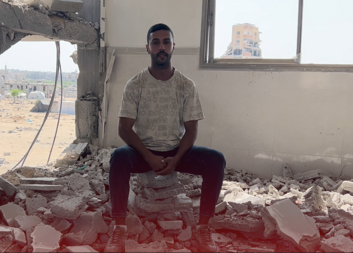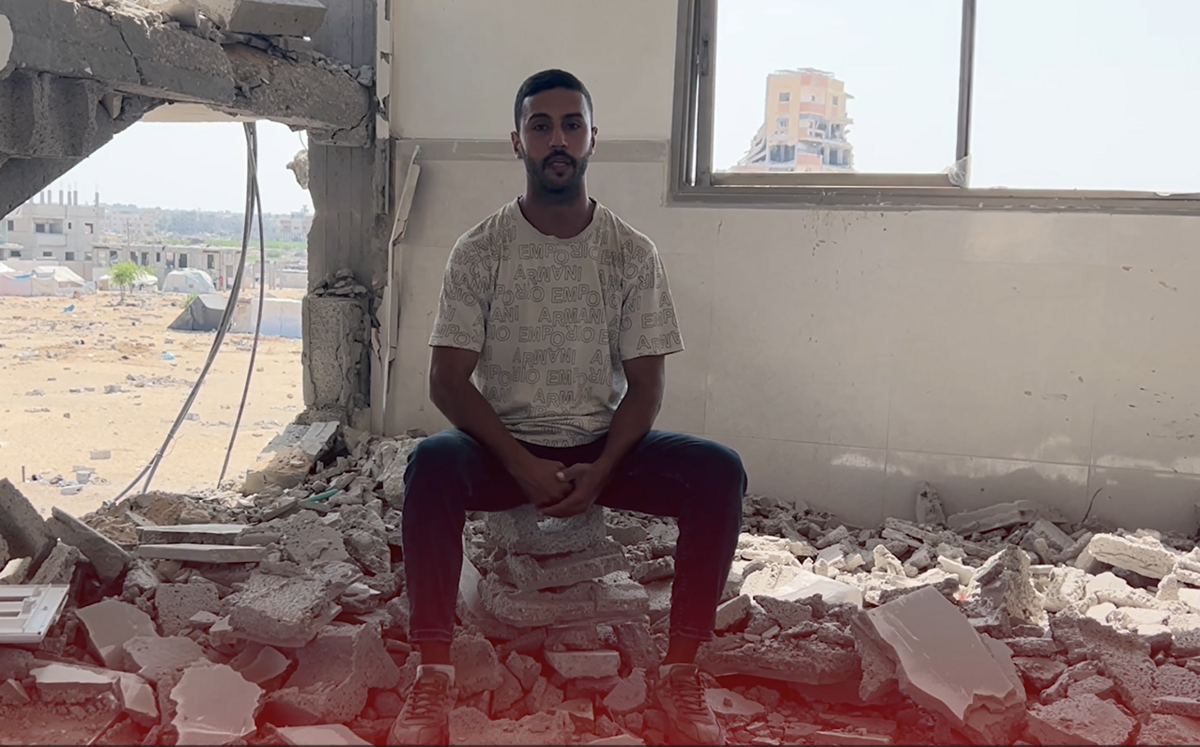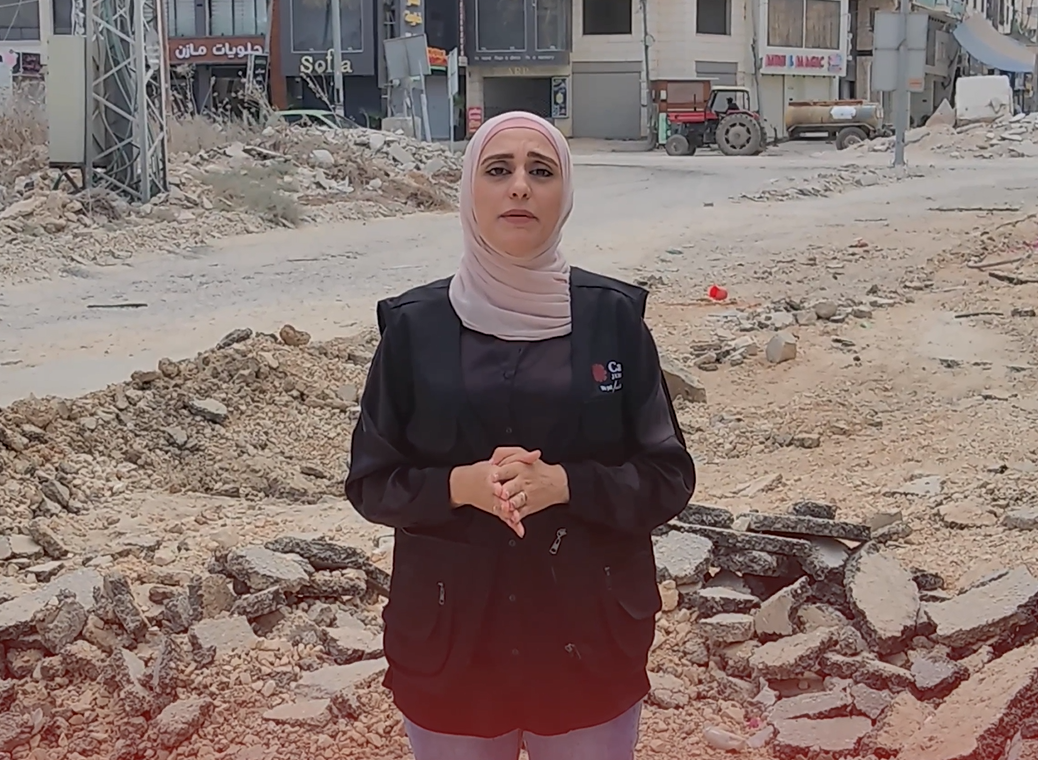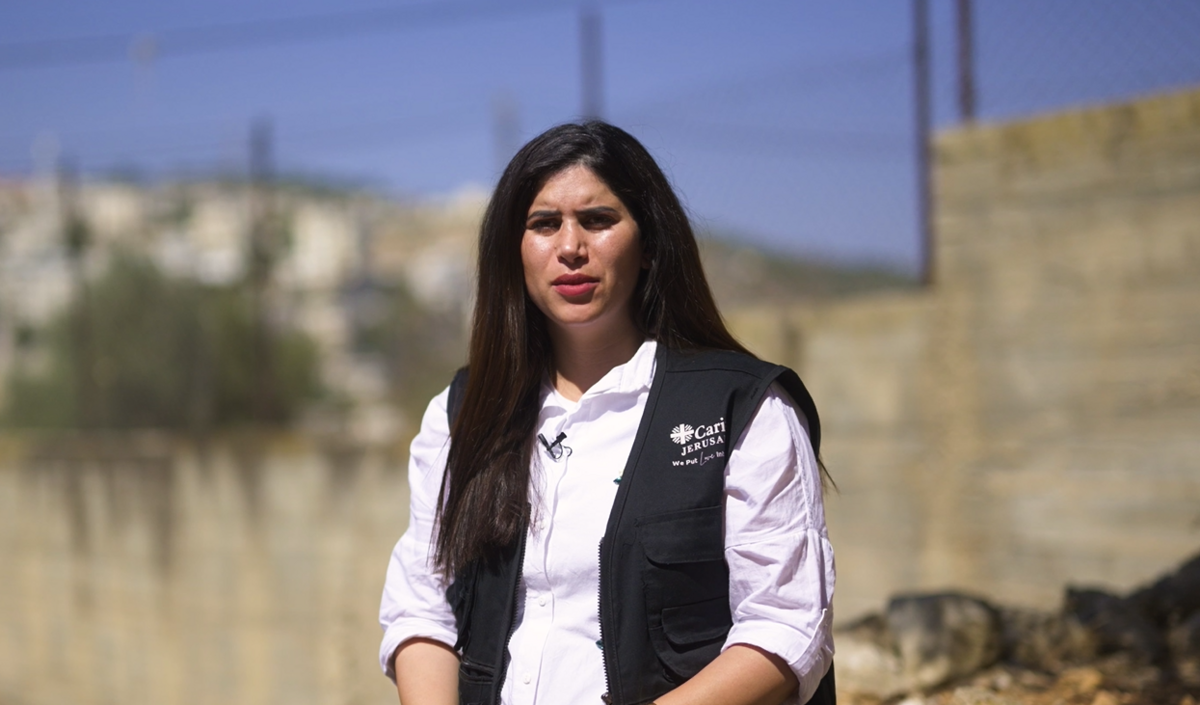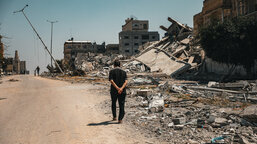The humanitarian situation in Gaza has reached a breaking point. Amid relentless bombings and forced evacuations, thousands of families have been displaced and le without essential services. Despite these challenges, Caritas is working tirelessly to support those in need, providing medical care, food assistance, and psychological support. In the midst of this devastation, individuals like Ahmad, Rula, and Mai share their stories of survival, resilience, and hope for a better future.
DONATE TO HELP CIVILIANS IN GAZA
I was lying on the floor, covered in rubble
Ahmad Al-Daya, who works in the media and communications department of Caritas Jerusalem, recounts his heartbreaking ordeal during the ongoing conflict. "The onset of this war was like any other, characterised by shelling, martyrs, and accelerated events. We did not know where it was going," Ahmad begins.
When the Israeli army ordered the evacuation of the northern Gaza Strip, Ahmad and his family were forced to leave their home in Gaza city and seek refuge in Khan Younis. "We did not want to leave, but the bombing was so cruel that we had to abandon our house in Gaza city and head south," he explains. After two months of relative calm, their temporary shelter was bombed on December 12, 2023, and Ahmad found himself buried under rubble.
"Suddenly I didn't hear, see or feel anything. I was lying on the floor, covered in rocks and rubble. I could only move my head and look around. It was very dark," Ahmad recalls. The most painful moment came when he discovered his brother in the ambulance. "I got into the ambulance and found my brother lying there with an amputated leg," he says, his voice breaking with the memory of the tragic night.
We hope to live in peace and safety
Rula Sawafta, a Caritas Jerusalem staff member from Tubas, faces the daily challenges of living and working in the occupied West Bank. Even before the recent aggression on Gaza, she and her colleagues contended with movement restrictions, checkpoints, and sudden military raids that disrupted their efforts to serve the local community.
"After the aggression on Gaza, these assaults have intensified greatly, especially against human beings, resulting in premeditated murder and the random killing of Palestinians," Rula shares. The impact on their work has been severe, with projects and activities frequently halted by the instability.
Rula also speaks of the psychological toll on families. "We experience panic and anxiety attacks, especially among children, as they head to school and sudden incursions take place," she says. "We hope to live like the rest of the nations and have access to basic needs, at least peacefully and safely,” Rula states, remaining hopeful.
What kind of life will my child live
For Mai, a resident of Bethlehem, life has been filled with uncertainty even before the conflict intensified. "I have always been afraid of the future—fear of what will happen to us as Palestinians living in the West Bank," she confesses. The war started just a month after her marriage, and with it came a wave of fear and anxiety about what lay ahead.
Now expecting her first child, Mai's concerns have deepened. "I keep thinking about what kind of life my child will live. Are they going to experience the same life we live? Or will they live a worse life? Or a better one?" she wonders. The war has put her dreams and plans on hold, forcing her to focus on survival and the hope that her child might have a brighter future.
The situation in Gaza is an unyielding crisis
The humanitarian crisis in Gaza has escalated to a point where the basic needs of the population are not being met. Access to clean water, food, and medical supplies is severely limited, with the majority of households lacking safe drinking water. Hospitals and medical centers are overwhelmed, unable to provide adequate care due to the shortage of supplies and personnel.
Amid this devastation, Caritas Jerusalem continues to work on the ground, providing vital support to those affected by the conflict. Their teams have set up makeshift clinics, distributed food vouchers, and offered psychological support to those traumatised by the ongoing violence. They strive to meet the basic needs of the displaced and give hope to those who have lost so much.
In cooperation with Caritas Jerusalem, Caritas Czech Republic is providing medical care for 5,000 local residents. The provision of medical aid in Gaza is financially supported by the Ministry of Foreign Affairs of the Czech Republic.
Despite the catastrophic conditions, our colleagues from Caritas Jerusalem remain unwavering in their dedication to the people of Gaza. "How beautiful it is to see a mother or child come to you for help and to be able to provide them with support in the most difficult circumstances," says Ahmad, reflecting on the organisation's impact.
A call for peace and rebuilding
"We hope for an end to the war, suffering, and displacement so we can return to our homes, neighbourhoods, streets, and everything as we once knew it," Mai expresses, echoing a sentiment shared by many in Palestine. The call for peace and a chance to rebuild is a plea not just for survival but for the right to live with dignity and hope.
Caritas continues to stand by the people of Gaza, committed to rebuilding lives and advocating for a peaceful resolution to the conflict.
Caritas Czech Republic has long called for an immediate ceasefire, the release of all hostages and arbitrarily arrested prisoners and the provision of adequate humanitarian aid.
If you would like to support Caritas' vital work in Gaza, your donations can make a life-changing impact on those in need.
Thank you for helping with us.
DONATE TO HELP CIVILIANS IN GAZA

